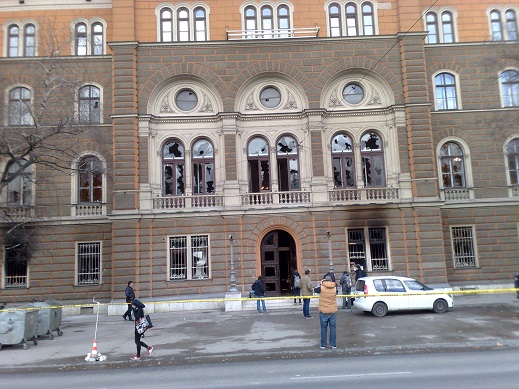

Looking at the protests from a scholarly point of view – e.g. through the lens of democratization theory – a few important conclusions, about the character of the regime and the state of democracy in Bosnia, can be drawn. Democratic transitions in Southeast Europe, and particularly in Bosnia, have not brought the results wished for by external actors and/or expected by the local population. The classical model of a linear, and normatively given, direction of democratic transformation has been repeatedly criticised and revised over the last decades. Scholars speak about the “end of the transition paradigm”, a “democratic rollback” or “de-democratization” processes. The coexistence of elections, division of power, and authoritarian rule moved to the forefront of attention; this is the point where the Bosnian case and on-going protests come into picture. Bosnia is a convincing case for revised insight that there is no linear pathway towards democracy, but rather, transition towards democracy might always include a transition from democracy, or even a regression of democracy.
Crises of democracies and economic downturns in Southeast Europe, in the last few years, have changed daily life. They have required new answers from politicians and institutions, and have posed new challenges for the mechanics of the upholding or stabilisation of power, and the production of legitimacy. Some regimes in Southeast Europe have sought to meet such social and economic challenges in a ‘grey zone’ of mixed democratic and (neo)authoritarian government techniques. Such regimes are characterised by the partial incorporation, or imitation, of liberal democratic procedures and formal institutions; which are, however, simultaneously undermined by an overall logic of limited pluralism. Some scholars argue that, particularly in Bosnia, we can observe the development of a ‘grey zone’ political system, which is dominated by ethno-political partitions and politicians exercising their power by relying on nationalist rhetoric, clientele networks, control of the media and other similar power tools.
It is against this background, which citizens are searching for new ways of expressing their interests and voicing their frustrations about the state of democracy in countries like Bosnia. Protests formulate a fundamental critique about the status quo. Here, we arrive at the core element of modern democracies – participation. Understood in broader sense, participation can be defined as an activity that reaches beyond the act of voting and includes other kinds of engagement in the political processes of decision-making and deliberation. From the degree and type of participation, one can draw conclusions as to the democratic legitimacy of the regime. If participation is limited, reduced or senseless (from the point of view of the engaged citizens), then the democratic legitimacy of the system is likely to falter. This is precisely the case in Bosnia. Bosnian citizens generally don’t trust their political institutions and elected leaders. They are deeply disappointed with the output of the system (output legitimacy), and do not see any possibility of influencing the political elites through elections, or any other form of participation (input-legitimacy). Against the background of the crisis, the input- and output-legitimacy in Bosnia, the current social protests can be seen as a legitimate, and genuinely democratic, outcry of citizens ready to start changing a regime that does not deliver.
We cannot foresee the further dynamic of the protests. Since the regime’s response to protest movements, or – to put it in the reverse order – the consequences of their activities, is essential for determining the democratic constitution of a country, it might be possible to describe the Bosnian political system by observing and analysing the response patterns towards the protest movements. A discursive accommodation of inputs, ideas, and their comprehensive realisation through legislation, would be a characterisation of a qualitative and good democratic system. In contrast, erratic reactions and partial ignoring indicate responses by ‘grey zone’ regimes. Now, looking at the reactions to the protests from the Bosnian political elites, they are clearly responses from a grey zone regime. Since the beginning of the protests, they have been attempting to misuse the protests for their own political purposes. Political leaders in Republika Srpska have portrayed the protests as ‘Anti-Serbian’ and for a pro-unitarist Bosnia. Bosnian Croats, or at least their political representatives in the HDZ, have accused Bosniaks and the international community of planning to abolish cantons in the Federation, thus limiting the influence of Croats in the state. Political leaders of the dominantly Bosniak parties have, once again, engaged in their usual “blame-each-other”-game.
Social protests in Bosnia have been a long overdue wake-up call. It is a wake-up call for political elites who, from February 2014 on, will – hopefully – no longer be able to base their politics on mere manipulation and empty rhetoric. It is also a wake-up call for the EU to put its enlargement fatigue aside, and start creating a new and coherent policy towards Bosnia. Bosnia needs a tailor-made approach, and the sooner the better. Finally, it is a wake-up call for every single man and woman in Bosnia to take responsibility for their fate, and to start creating a better, and more free, Bosnia. These protests could help move Bosnia out of the ‘grey zone’ of rule, towards a more democratic system that is based on the broad participation of the citizens (better input) and adequate reactions from the elected leaders to the citizen’s demands. (output legitimacy).